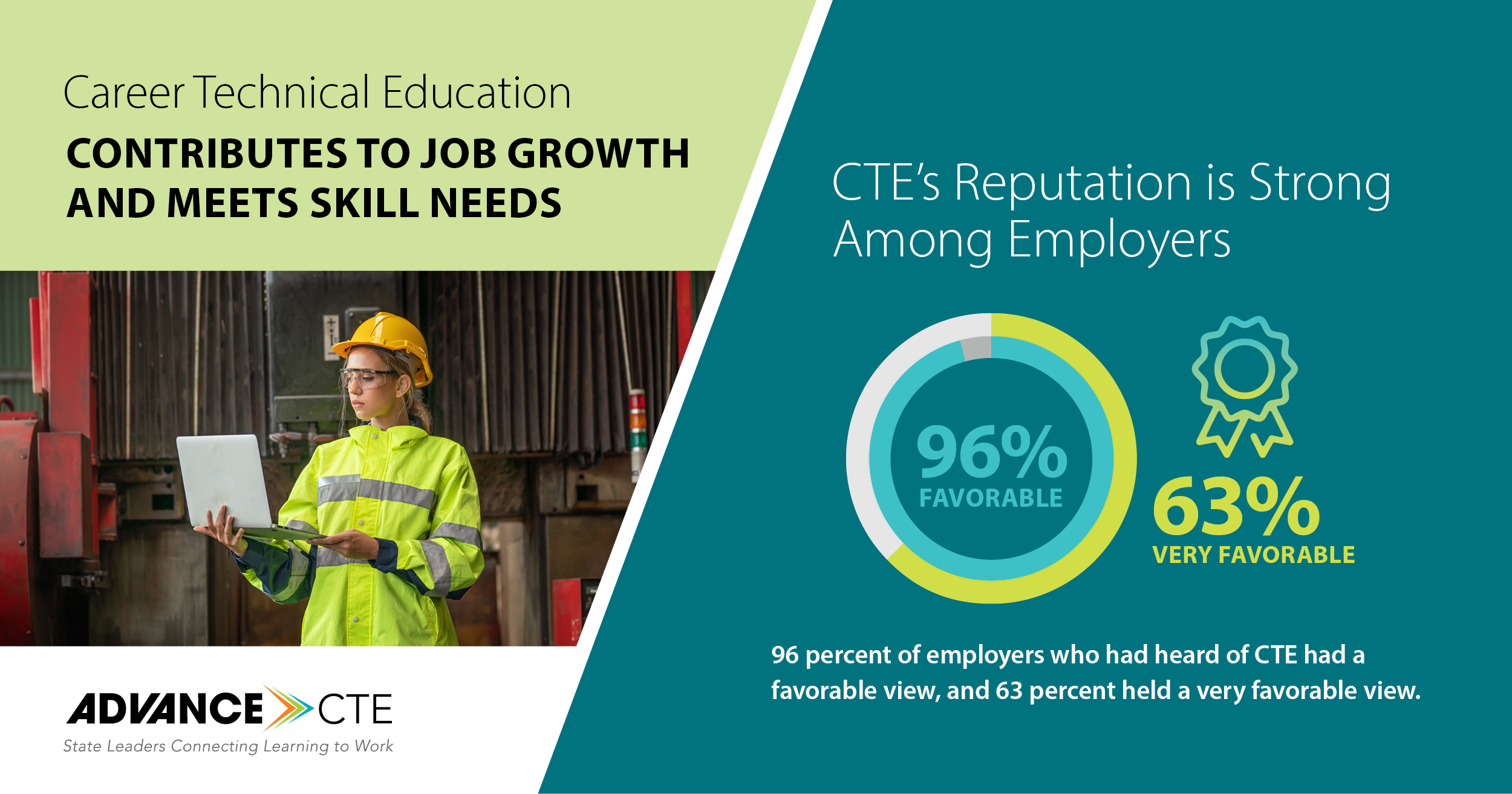 Today, Advance CTE released findings from a national survey of more than 300 employers on the top skills desired by employers, their attitudes toward Career Technical Education (CTE), and their current involvement in CTE partnerships. The respondents were full-time company employees who were actively involved in hiring decisions.
Today, Advance CTE released findings from a national survey of more than 300 employers on the top skills desired by employers, their attitudes toward Career Technical Education (CTE), and their current involvement in CTE partnerships. The respondents were full-time company employees who were actively involved in hiring decisions.
Shifting the Skills Conversation: Employer Attitudes and Outcomes of Career Technical Education is highly encouraging for the growth of employer engagement with CTE programs – not only do employers of all sizes have an overwhelmingly positive view of CTE, but are enthusiastic about increasing involvement in CTE partnerships in a variety of ways. Employers also strongly support increased investments in CTE and see a direct benefit to such investments to their business, industry and the economy overall.
This research provides state leaders with impactful data points and messages that shift the skills conversation with employers to intentionally pursue CTE as a proven strategy for hiring talent, enhancing business’ bottom line and growing their business and industry
Key Findings
- Employers view CTE very positively and see CTE as a value-add. Employers view learners with CTE experience as attractive job candidates for both meeting skill needs and business growth, and employers hiring from CTE were more likely to report positive industry growth and trends. Eighty-three percent of respondents agree that hiring employees with CTE experience would improve their business’ bottom line.
- Employers value skills more than degrees, and believe CTE will help meet their skills-based hiring needs. One of the most encouraging findings from this research indicated positive progress in employers favoring competencies over academic degrees, a key metric to advance equity in hiring processes. Employers chose categories such as flexibility, adaptability and job-specific skills as the most important traits for recent graduates by a margin of 20 percent over degrees. Additionally, employers saw robust alignment with their skill needs and the traits found in job candidates with CTE experience.
- Employers overwhelmingly want to expand their partnerships with CTE programs. While almost every employer survey expressed interest in expanding CTE partnerships, only around 25 of employers were currently involved in these partnerships, and just slightly more than 50 percent reported recruiting through CTE channels. The findings demonstrate there is a great opportunity to expand partnerships at all levels with industry.
- Employers strongly favor increased public funding for CTE. Over 90 percent of employers reported that increased funding for CTE would have a positive impact on their business, industry and the overall economy.
Next Steps
There are several communication-focused steps states can take to put this research into action to shift the skills conversation with employers and stakeholders that work with employers:
- Utilize and share messaging resources: Advance CTE has created a fact sheet and key messages tool that provide ready-made visuals and data points to use when communicating with employers and policymakers about the value of investing in and partnering with CTE programs.
- Evaluate and develop consistent routines for communicating partnership and advocacy opportunities with employers. Employer enthusiasm for involvement in CTE programs increased with repeated exposure to messages about the impact for CTE on learner and business growth. Among employers who reported already hiring from CTE programs, favorable perceptions of CTE increased from 69 percent to 79 percent after viewing a video about CTE.
- Serve as capacity-builders to build and sustain local employer partnerships: When asked about preferences for learning more about opportunities to participate in CTE programs, local CTE programs were chosen as the top four out of 11 outreach options. States can provide local CTE leaders tools and infrastructure for relationship-building, such as Hawaii’s ClimbHI Bridge initiative or Colorado’s CareerWise initiative, or simply creating communication tools featuring employer champions for CTE, such as South Carolina’s promotional videos featuring learners in in-demand sectors.
- Leverage state-level business and industry partnerships: State-level partnerships provide another avenue to access local capacity-building beyond CTE-centric avenues, such as the partnership between the NJ Business & Industry Association and New Jersey Council of County Vocational-Technical Schools to launch the New Jersey Employer Coalition for Technical Education. Advance CTE’s guide to enhancing industry collaboration provides multiple strategies for capacity expansion and stakeholder engagement, such as the Maryland Department of Education’s alliance with the Maryland Business Roundtable for Education.
For more information, visit the Working with Policymakers web page to access the full report and supplemental tools, as well as additional advocacy materials and the Learning that Works Resource Center for employer engagement-related resources and tools.
Stacy Whitehouse, Senior Associate for Communications and State Engagement
